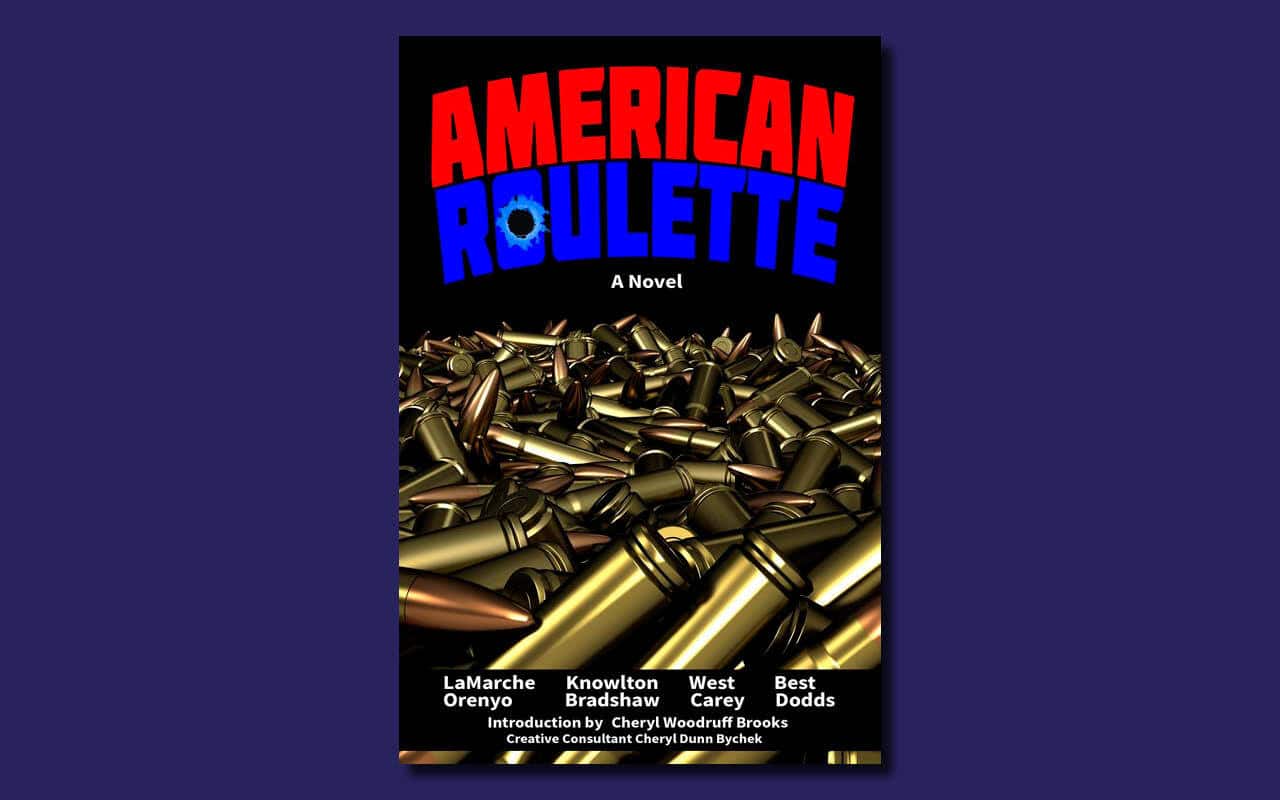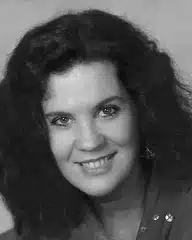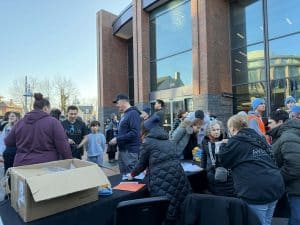This past winter Matthew Best wrote to me, desperate to do something about gun violence. Matthew’s a Lutheran minister who helps me with my sideline – fighting homelessness.
He had book ideas. All pretty good, his idea for what is now American Roulette was the best. A “day in the life novel” about eight ordinary people careening toward a uniquely American disaster. They meet at the local mall and one character changes the lives of all the others. Knowing how tough a first book is, I suggested we modify his idea, having each character written by a different author. I called my publisher and a fistful of standout writers. The result – snippets of which follow – was written and published in just six months.
We’re on track to lose more than 50,000 Americans this year to gun violence. Firearms kill more children and teens than any other calamity including disease and car accidents. Our book doesn’t pretend to have answers – although without telling you which one of us did it, rest assured that the author who created the killer does have a PhD in the way people think. We’ve been endorsed by Fred Guttenberg and Kris Brown of Brady, because they hope a work of fiction breaks through where the truth is too horrible to bear.
Here is a taste of the style and format of the book. It’s a murder mystery with a factual introduction as real as a heart attack. This excerpt contains no spoilers, just a taste of what the novel holds as each day a new, real life mass shooting, rocks the United States. We’re slated to have more than 700 this year alone. We need to wipe that slate. Consequently, the other authors and I agreed to donate 100 percent of the book royalties to stop gun violence. It’s the least we can do.
Introduction by Historian Cheryl Woodruff Brooks.
My initial first-hand experience of gun violence took place when I was six years old. My teenage neighbor, Karen, shot herself in the stomach. She had been rummaging through a drawer in her parents’ bedroom, and their gun accidentally went off. Since we lived directly across the street and our parents were friends, two of her younger siblings ran to our home after discovering Karen’s body. I will never forget the expressions on their faces as they frantically attempted to explain the incident to my mother. Interrupting their wedding anniversary dinner, her parents rushed home to find an ambulance and police cars in front of their home.
My second encounter with the harsh reality of gun violence took place in my own family, right about the time I turned eleven. Tragically, my young cousin, then just twelve years old, shot himself in the head while engaging in a reckless game of Russian Roulette with some friends. The gun belonged to one of his parents.
Emma Franz, 5:30 A.M.
A police officer tapped his baton against the passenger side window.
Startled, Emma Franz lurched forward, inadvertently beeping the horn. “Oh, for Pete’s sake,” she muttered. No longer reclined, she reached her hand down the left side of the driver’s seat, depressing the button to bring her seat back to its upright position. Emma looked across the passenger compartment and out the glass. A beefy-faced man with kind eyes and an exaggerated frown gestured for her to roll the window down.
“All right, all right. Hold your pants on,” Emma called to him. Reaching forward with her right hand, she turned the key she’d left in the ignition and used the juice to lower the window across the way. “Hey, Eduardo. What’s the problem?”
Leaning his arms on the top of the opening, the cop poked his head into the car, rocking it from left to right. Inhaling and exhaling loudly, Eduardo responded, “Emma, you know what the problem is. You! You’re the problem.”
Frowning again, for real this time, he said, “You know you can’t sleep here. I’ve told you this a dozen times. It’s loitering. It’s not safe. And it’s against county code to have overnight parking in any commercial zone.”
Rubbing her face, then digging around in the glove box to find a bottle of drops, Emma tilted her head back and moistened her eyes. “Argh!” she shouted. “My lids will freeze if I don’t learn to warm these up first.” Cupping the bottle in her hands, she continued, “I’ll remember next time… I hope.”
Turning to respond to the peace officer, Emma couldn’t help but smile at him. He’d thrust his upper body into her car, AKA bedroom, like a moose over a log-cabin mantle. “Eduardo, you know I got nowhere else to sleep on the days I work doubles. My mom’s house is two hours up the interstate, and even if I could make it all that way after working twelve hours, I don’t have the money for the gas. If you just lighten up and let me stay here, I can make enough cash to get an apartment for me and the kids. If you don’t, I’ll fall asleep at the wheel one night and then you’ll be cleaning up one heck of a mess.”
Caitlin Browning, 6:00 A.M.
“Hi, Mom.” The teen opened one eye. “I’m already up.”
“So I see,” her mother answered with a smile.
“Well, sort of. I woke a little while ago. Didn’t realize I dozed off again.”
“Your appointment at the outpatient clinic is scheduled for eight forty-five. I can drop you off on my way to work. What would you like for breakfast?” Caitlin was about to protest but changed her mind, knowing that skipping a meal would cause her mother concern. “I guess I can’t take my meds on an empty stomach.” Pushing off her blankets, she continued, “Just some toast and jelly. I’m too nervous to eat more. I don’t really know what to expect at ‘Happy Dale.’”
“Happy Dale? Isn’t the clinic named ‘Springdale’?”
“I guess. All the inmates—um, excuse me, patients—call it Happy Dale. I
heard it’s a reference to something once said in a movie about a mental institution.” Caitlin shuffled over to her bureau to find some clothes.
“Oh, I know,” chuckled her mother. “That’s from an old movie called Arsenic and Old Lace. Cary Grant’s character used the term, Happy Dale, meaning the mental hospital where he thought his two old aunts needed to be. The film’s funny and charming. Maybe we can watch it sometime.”
Caitlin blanched. Geez, I just got released from the “funny farm,” and my mom suggests I might find a movie about a mental hospital amusing. Rolling her eyes, she quipped, “I guess Cary Grant is charming, but Happy Dale, not so much.”
Changing the subject, Nora offered, “I have an idea. How would you like to have your hair and nails done today? I have an appointment with Teresa at one thirty, but I can’t go. If you’d like to take my place, I’ll let Teresa know to expect you instead. I checked today’s schedule—you should be finished at Happy Dale no later than one—if you stay for lunch. It’s a lovely day, and just a short walk from the clinic to the mall.”
As Caitlin opened her lower drawer to grab some socks, her nightgown slid over her shoulder and exposed several thin, red scars.
Nora looked away as the wounds on her daughter’s arms became visible.
“Mom,” Caitlin began. “I’m so sorry for worrying you and Dad and for causing you so much grief. I didn’t mean to…” She gulped, bursting into tears before she could say more. “I should have gotten dressed before you saw these marks again. I’m sorry.” She snatched a gray sweatshirt from her bed and slipped it over her head. Then she stepped into a matching pair of sweatpants. Nora rushed to embrace her child.
“Caitlin, no need to apologize,” she murmured as she cradled Caitlin’s head. “It’s not a fault situation. I’m just so sorry that your dad and I didn’t realize . . . that we missed the clues . . . that we failed you. We didn’t understand the depth of your pain or your despair.”
Moving to hold her daughter at arms’ length and establishing eye contact, she added, “Remember, depression is an illness, like diabetes or asthma. It’s not something to be ashamed of or hidden. But depression does require treatment. Just as diabetes and asthma do.”
Earl Bricker, 11:15 A.M.
Earl shot his wife a quick glance before returning his eyes to the road. “I’m sure there will be lots of women in fancy-schmancy dresses at this ceremony. But, darling, you and our little Becky will outshine every single one of them, no matter what you wear.”
MaryJane pulled a tissue from her purse and dabbed at her eyes. “I can’t believe Becky’s getting married. When she moved in with Brooks, I thought she’d end up getting hurt. A man like that, coming from family money, growing up with every advantage. He just didn’t seem like the right fit for Becky. Plus, both being architects, working together in the same firm. That could be a problem. But she’s changed and grown. And, I have to say that Brooks surprised me. I like him a lot, and he seems to be good for the woman Becky has become.”
“Harumph,” Earl snorted. “I’m still not sure about Brooks. He’s a hard guy to talk to. Always going on and on about his rowing or crew or whatever. And I know he’s an architect, but how many times can he rave about the ‘fusion of utility and pleasing form’ in every old farmhouse we pass?” Earl bit his lip. “But he’s Becky’s choice. She’s a grown woman. So, we don’t really have a say in this marriage, do we?”
Earl clicked on his turn signal to merge onto the exit ramp. Just as he was about to change lanes, a bright-red sports car screamed by on the right. “Watch where you’re going, pretty boy!” Earl jerked the truck back into his lane. “Foreign import. Out-of-state plate. Where are the cops when you need them?” he complained as he slowed.
MaryJane ignored Earl’s outburst and looked at her watch. “We made good time.” She lifted her handbag from the floor onto her lap. Wringing the strap with her hands, she said, “I hope I can find a dress in either Macy’s or Nordstrom. Today is my last chance to find something decent to wear. If I do find a dress, we should celebrate. Earl, what do you think about stopping at Red Lobster on the way home?”
His arms still tingling and heart pounding from the near miss with the sports car, Earl barely heard his wife’s question. Although he’d never share his uneasiness with MaryJane, traffic congestion and driving into this sprawling mall put Earl on edge. Cars coming from everywhere. Parking stalls designed for midget cars instead of decent, full-size pickup trucks. Pedestrians stepping in front of you like they own the road. At the first stop sign, a four-way, he took a deep breath, his hand brushing his jacket to confirm that his holstered pistol lay beneath. I hate coming to this place.
When his turn at the stop sign came, he drove forward into a section of the parking lot bathed in shadow. On the left, a towering sign blocked the rays of the early afternoon sun, its two-foot letters proclaiming, Liberty Mall.
Roger Elliot, 3:25 P.M.
His mind drifted back to the crisp autumn day when he joined the throng crowding into the gun show. The overwhelmingly male presence comforted Roger. Guns are power, he thought. Men have given up enough of that. This House of Power should be ours and ours alone. Ignoring the vendors hawking camping gear, local honey, and beef jerky, Roger stalked the aisles until he tracked down his quarry. Black Beauty. There she lay, glistening in the fluorescent light like a dark diamond. Noting Roger’s intense interest, the vendor wasted no time handing him the rifle. Roger aimed it at the ceiling, centering the sights on a flickering light. Lowering the gun, he cradled it in his hands, eyes alight with joy as he caressed the stock. “Is this the military version?”
The man shook his head. “Sorry. Can’t get those. The name’s the same but this here’s the civilian version. Ain’t no big deal, though. Only difference is this barrel’s ‘bout an inch longer and it’s semi-auto, not full. Which is a good thing, pal. It fires 5.56 NATO rounds, but the mag only holds thirty. At full auto, you’d be out in four seconds.” The man mimed aiming a rifle at the crowd around them. “With semi, you can pick and choose your shots.” At both “pick” and then “choose,” he pulled an imaginary trigger.
Roger stared down at the weapon. So much power, right here in my grasp. Mine. You’re mine! A thrill bolted through his body, settling in his loins. He raised his eyes to the gun seller, hoping his arousal wasn’t evident. The man was more interested in Roger’s face.
“Looks like I’ve made a sale. Am I right?”
Roger nodded. The man named a price and Roger forked over the cash. As the gun seller boxed up the rifle, Roger shifted from foot to foot, like a kid waiting for a Dixie cup from the ice cream truck. The man handed him the box. “Happy shooting, bud!”
Clutching the box to his chest, Roger turned to go, then paused. “Isn’t there a form or something I need to sign?”
The man chuckled. “Not in this state, pal. I’m a private seller. Since this ain’t my main source of income, I can buy and sell all the guns I want without the feds sticking their noses into it. Now go get yourself some ammo and have you some fun!”
Steven Bradley, 9:45 P.M.
Stepping outside the station, Steven saw a group of officers huddled around a fifty-five-gallon burn drum. Steven watched from the doorway. Suddenly, Sinowitz exited the rear of the building, carrying a gym bag.
His peers greeted him with grunts and sighs. Silent, head down, Sinowitz set the bag on the ground and removed his blood-stained boots. The beaten cop threw his foot-wear into the flames. He then stripped off his shirt, pants, briefs, and socks—feeding the fire with his uniform until his exposed body stood silhouetted by the orange glow of the fire.
The burning boots sent up a black, acrid plume into the sky. Two of the officers backed away from the fire, coughing. Two others tried to comfort him.
He shoved them aside.
Reaching into his gym bag, the naked man clothed himself in workout gear. He bent down to tie his shoes, then stood in sweats and sneakers to watch the flames a moment longer. Steven heard him murmur apologies to his coworkers.
Sinowitz turned away from the fire barrel and disappeared into the night.
American Roulette. Published October 24, 2023, Milford House imprint of Sunbury Press. Written by Matthew Best, Robert Bradshaw, Cheryl Dunn Bychek, Andrew Carey, PhD, James Dodds, Sherry Knowlton, Pat LaMarche, Phillis Orenyo, JM West.







